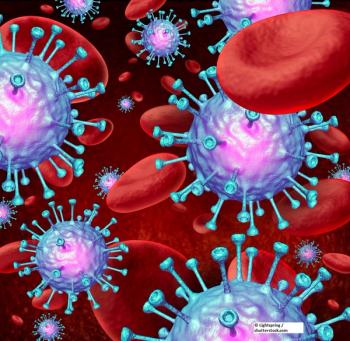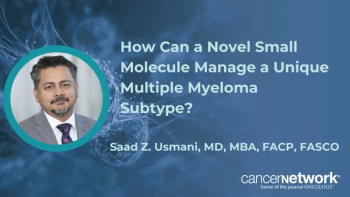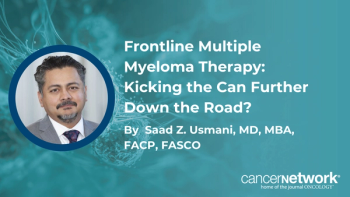
Final results of PX-171-003-A0, part 1 of an open-label, single-arm, phase II study of carfilzomib in patients with relapsed and refractory multiple myeloma
Final results of PX-171-003-A0, part 1 of an open-label, single-arm, phase II study of carfilzomib in patients with relapsed and refractory multiple myeloma
Final results of PX-171-003-A0, part 1 of an open-label, single-arm, phase II study of carfilzomib in patients with relapsed and refractory multiple myeloma
S. Jagannath, R. Vij, K. Stewart, et al
Methods: The multicenter, open-label PX-171-003-A0 study enrolled 46 multiple myeloma patients who had relapsed after > 2 therapies, had failed bortezomib (Velcade) and at least one immunomodulatory agent (thalidomide or lenalidomide [Revlimid]). They had also been refractory to their last treatment, defined as progressing ≤ 60 days of their last therapy or having < 25% response to it. Patients received carfilzomib (20 mg/m2 IV d 1, 2, 8, 9, 15, and 16 every 28 days) for up to 12 cycles. Clinical benefit response (CBR) was defined as molecular response (MR) or better.
Results: Thirty-six (78%) had progressed ≤ 60 days of last therapy and 10 (22%) had no response to last therapy. Thirty-nine patients completed at least 1 cycle of carfilzomib, had measurable M-protein, and were evaluable for response. The median number of prior therapies was 5 (range 2–15). All patients had previously received bortezomib, 91% prior thalidomide, and 89% prior lenalidomide. Also, 83% had prior stem cell transplantation and all had failed combinations including anthracyclines (80%) and/or alkylating agents (94%). Patients received a median of 3 cycles (range 1–12), and 13 patients completed ≥ 6 cycles.
The CBR was 26% (10/39 evaluable patients), including 5 partial responses and 5 MRs. Five bortezomib-refractory patients (19%) achieved MR (3) or PR (2). Median progression-free survival was 5.1 months.
The most common adverse events were fatigue, anemia, thrombocytopenia, nausea, upper respiratory infection, increased creatinine, and diarrhea. Peripheral neuropathy occurred in < 10% of patients.
Conclusions: Single-agent carfilzomib is active (18% PR; 8% MR) in heavily pretreated refractory MM patients who have failed all proven agents. Median response duration was 7.4 months. The drug is well tolerated, producing low rates of peripheral neuropathy.
Newsletter
Stay up to date on recent advances in the multidisciplinary approach to cancer.










































